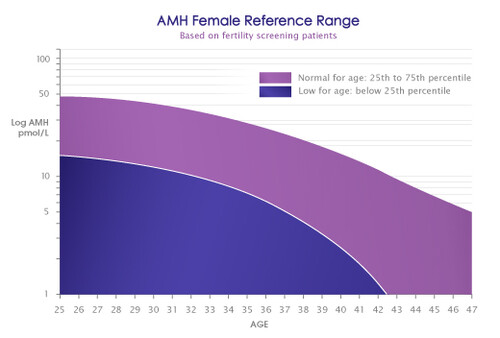Anti Mullerian Hormone (AMH) Test & Ovarian Reserve
Unlike men, who continually produce sperm, women are born with their lifetime supply of eggs. As you age, these eggs gradually decrease in both quality and quantity.
Anti-Mullerian Hormone (AMH) is secreted by cells in developing egg sacs (follicles). The level of AMH in your blood is a good indicator of your ‘ovarian reserve’ – how many eggs you have remaining, and therefore roughly how many fertile years you have left.
AMH levels don’t change during your menstrual cycle, so we can take this blood sample at any time of the month, even if you are still using oral contraception.
Enquire Today
What is an AMH test and what will it tell me?
An AMH test involves giving a blood sample, which is analysed in our in-house endocrinology laboratory.
An AMH or 'ovarian reserve' test can help to understand your remaining number of eggs, giving an indication of how many remaining fertile years you may have.
Unfortunately, testing your AMH levels does not tell us the quality of your remaining eggs.

Who should have an AMH test?
The AMH test is useful if:
- you have been trying to conceive for over six months, and want to check your ovarian reserve is appropriate for your age
- you are considering IVF or other fertility treatments, as low levels of AMH may affect the potential success of any future IVF treatment, and your response to IVF medication
- you have had chemotherapy or ovarian surgery and want to know if it has affected your fertility
- you have a suspected an ovarian tumour
- you would like to conceive in the future, and just want to understand your current position
How much does an AMH cost?
At Queensland Fertility Group, the cost of an AMH test is $90 (this is not covered by Medicare).
What if I have a low AMH?
It is important to remember that women with a low ovarian reserve and women with a high ovarian reserve fall pregnant naturally at exactly the same rate. This is because both groups ovulate one egg per month, and AMH is not an indicator of egg quality.
However, AMH is a useful tool to predict response with IVF, in terms of the likely egg number that will be obtained in an IVF cycle. It can also give advanced warning that ovarian reserve is declining, prompting women to explore their reproductive options sooner.
If you have a low AMH level, indicating poor egg reserve, your GP may consider referring you to a fertility specialist for further explanation, or you can simply book an appointment with a fertility specialist to discuss your options.
When should you see a fertility specialist?
If you are over 35 and have been trying to get pregnant for more than 6 months, or under 35 and have been trying for more than 12 months it’s time to seek the advice of a Fertility Specialist. If you have irregular periods, or are already aware that you have a fertility issue you should seek advice sooner.
What to expect at your first appointment?
During your first appointment you will meet with one of our experienced Fertility Specialists to discuss your medical history. Your doctor will typically ask you about your menstrual history, timing of intercourse, lifestyle factors, sexual issues and previous pregnancy history. You should feel relaxed about this appointment – your Fertility Specialist will guide the conversation, and the questions asked are designed to help you.
This first appointment can take anywhere from 30 minutes to an hour, depending on your medical history and discussion that follows.
How much is your first appointment with a fertility specialist?
If you are specifically seeking help to fall pregnant, it is recommended your partner attends the consultation as well. The initial consultation charge with a Fertility Specialist is on average from $220 to $350 and Medicare will reimburse approximately $95.00.
For more information or to book a consultation with your preferred specialist, fill out the form below.
To find out more about the AMH test, call 1800 111 483 to speak with an experienced Fertility Advisor or contact us below.